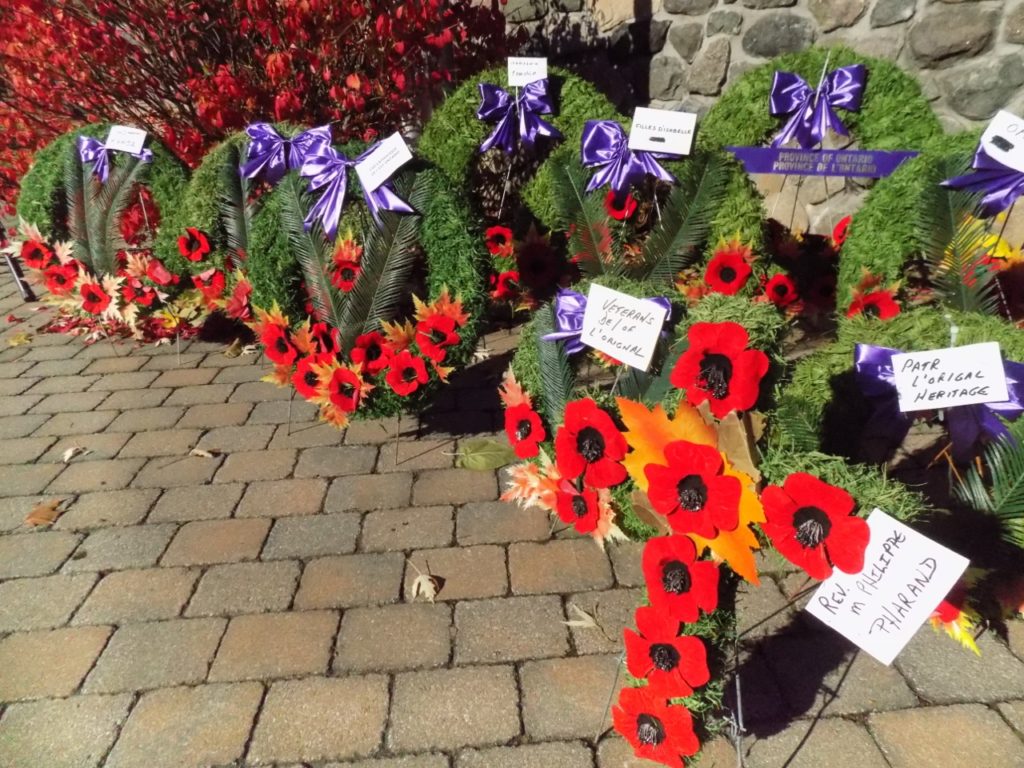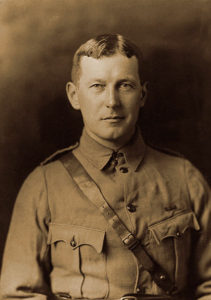Poppies and bells of peace this 100th Remembrance Day in Canada

Wreaths and crosses decorated with poppies at the war memorial in L’Orignal, Ontario. Photo; James Morgan
Remembrance Day in Canada has an extra significance this year. Originally known as Armistice Day, it recognized the sacrifices made by Canadians as part of the Canadian Expeditionary Force (CEF) of the British Army in World War I. However, it evolved to become a day of remembrance for all Canadian veterans, living and dead, who have served in every conflict or peacetime.
Remembrance Day 2018 will be the 100th anniversary of the end of WW I. Canada, as a British dominion that did not have any independent control over its foreign affairs at the time, was immediately part of the conflict when Britain declared war in September 1914, and it was in the war until it ended on November 11, 1918.
This year, to honor the 100 years since the war ended, many communities across the country are taking part in “The Bells of Peace” initiative. The Royal Canadian Legion is asking churches and towns or cities with clock towers to ring their bells at sundown on November 11 to recognize and remember the sacrifices made by Canadians in World War I. During those four years, 67,000 Canadians were killed in action, and 250,000 were wounded.
Perhaps the biggest cultural legacy of remembering WW I to Canadians is the very symbol of the day itself, the poppy. It’s become the floral emblem, although usually reproduced in plastic or paper, of remembering the sacrifices made by those who served and are serving. During the weeks leading up to Remembrance Day, the poppies are available from boxes by cash registers in stores, or from members of the Legion or the army, air, and sea cadets who offer them in public places. There’s no price to buy one, and the cost is by whatever one chooses to donate. The poppy is a registered trademark of the Royal Canadian Legion. In province’s that issue special licence plates for veterans’ vehicles, it’s the poppy that appears on the plates.
Just how did the poppy, with its less glamorous role as the source of heroin which has complicated conflicts in places like Afghanistan, become a symbol of remembrance and respect for veterans? It’s all because of a soldier, physician, and poet named John McCrae.
McCrae was born in Guelph, Ontario in 1872. He trained as a physician at the University of Toronto medical school and interned at Johns Hopkins Hospital in Baltimore. He also began publishing short stories and poems.
In 1899, he joined the army and served as a medical officer during the South African War. After returning home, he served as a pathologist at hospitals in Montreal and lectured at the University of Vermont Medical College in Burlington.
When World War I began in 1914, McCrae joined the army again, this time as an officer in the Canadian Field Artillery. He tended to the wounded and dying, especially during the second battle of Ypres in the Flanders region of Belgium. A close friend of McCrae’s was killed there, and the next day, he wrote In Flanders Fields in honor of his friend and to give a voice to him and the others who died there.
In Flanders fields the poppies blow
Between the crosses, row on row,
That mark our place; and in the sky
The larks, still bravely singing, fly
Scarce heard amid the guns below.We are the Dead. Short days ago
We lived, felt dawn, saw sunset glow,
Loved and were loved, and now we lie
In Flanders fields.Take up our quarrel with the foe:
To you from failing hands we throw
The torch; be yours to hold it high.
If ye break faith with us who die
We shall not sleep, though poppies grow
In Flanders fields.
During the summer of 1917, McCrae became ill and progressively weak. By this time a Lieutenant-Colonel, he was transferred to a British Army hospital in France in January 1918 where he died on January 28.
After In Flanders Fields was first published, the poppy began appearing as a symbol of remembrance in wartime advertising, but McCrae’s death and legacy made it an even stronger one. Canadians gather at war memorials on Remembrance Day wearing poppies. Wreaths covered in them are placed by community organizations and government representatives at those ceremonies. In the United States, poppies are instead distributed on Memorial Day when Americans remember the sacrifices of past veterans. It’s all because of a poem by an army doctor from Guelph, Ontario.








